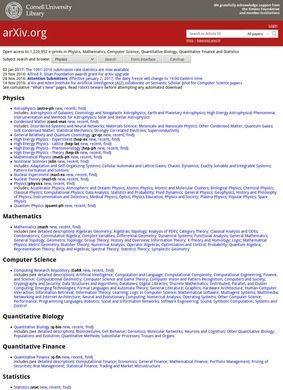ArXiv.org is an open-access online e-print archive that has positioned itself as an important resource for professionals and scholars in the fields of physics, mathematics, computer science, and more. Serving as a repository of 2,334,039 scholarly articles, this site is a valuable research tool. However, it is important to note, materials found on this platform have not undergone a conventional peer-review process, which could sway an academic audience's perception of credibility.
Notwithstanding, numerous areas of specialization are catered to, including quantitative biology, quantitative finance, statistics, electrical engineering and systems science, and economics. This denotes that, despite its primary focus on physical sciences, arXiv.org is an interdisciplinary platform that caters to a wide range of academic fields. This eclectic assortment signifies the platform's commitment to providing diverse, quantitative research material.
ArXiv.org has established an intuitive navigation system that aids users in conducting subject-specific searches. Similarly, the browsing feature helps users to discover both specific titles and categories. This user-oriented design, coupled with its rapidly expanding database, makes the site an enriching resource for professionals, researchers, and students.
The platform also features updates to maintain a system streamlined with the recent scholarly trends, such as the announced upgrade to TeX Live 2023 for all new submissions. These regular system advancements ensure that users will have access to the latest scholarly resources and tech-compliant submission options.
Overall, while the absence of a peer-review process might potentially reduce arXiv.org's appeal for some, its vast reservoir of scholarly articles, covering a multitude of academic disciplines, coupled with its user-oriented functionality and commitment to maintaining an up-to-date system, make it an important hub for academic research in the digital age.
